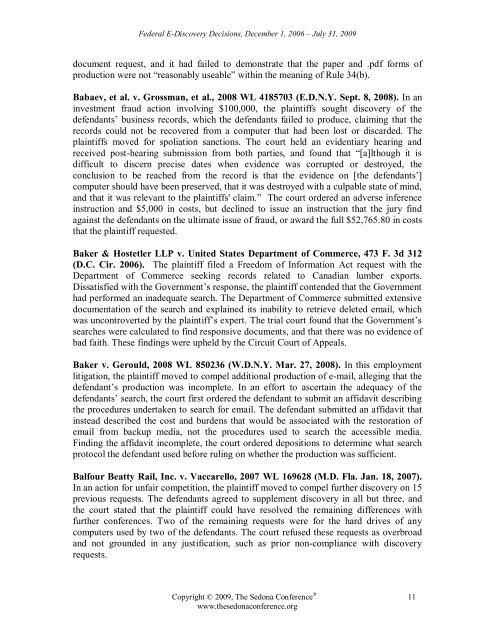Federal Court Decisions Involving Electronic Discovery, December 1 ...
Federal Court Decisions Involving Electronic Discovery, December 1 ...
Federal Court Decisions Involving Electronic Discovery, December 1 ...
Create successful ePaper yourself
Turn your PDF publications into a flip-book with our unique Google optimized e-Paper software.
<strong>Federal</strong> E-<strong>Discovery</strong> <strong>Decisions</strong>, <strong>December</strong> 1, 2006 – July 31, 2009<br />
document request, and it had failed to demonstrate that the paper and .pdf forms of<br />
production were not “reasonably useable” within the meaning of Rule 34(b).<br />
Babaev, et al. v. Grossman, et al., 2008 WL 4185703 (E.D.N.Y. Sept. 8, 2008). In an<br />
investment fraud action involving $100,000, the plaintiffs sought discovery of the<br />
defendants’ business records, which the defendants failed to produce, claiming that the<br />
records could not be recovered from a computer that had been lost or discarded. The<br />
plaintiffs moved for spoliation sanctions. The court held an evidentiary hearing and<br />
received post-hearing submission from both parties, and found that “[a]lthough it is<br />
difficult to discern precise dates when evidence was corrupted or destroyed, the<br />
conclusion to be reached from the record is that the evidence on [the defendants’]<br />
computer should have been preserved, that it was destroyed with a culpable state of mind,<br />
and that it was relevant to the plaintiffs' claim.” The court ordered an adverse inference<br />
instruction and $5,000 in costs, but declined to issue an instruction that the jury find<br />
against the defendants on the ultimate issue of fraud, or award the full $52,765.80 in costs<br />
that the plaintiff requested.<br />
Baker & Hostetler LLP v. United States Department of Commerce, 473 F. 3d 312<br />
(D.C. Cir. 2006). The plaintiff filed a Freedom of Information Act request with the<br />
Department of Commerce seeking records related to Canadian lumber exports.<br />
Dissatisfied with the Government’s response, the plaintiff contended that the Government<br />
had performed an inadequate search. The Department of Commerce submitted extensive<br />
documentation of the search and explained its inability to retrieve deleted email, which<br />
was uncontroverted by the plaintiff’s expert. The trial court found that the Government’s<br />
searches were calculated to find responsive documents, and that there was no evidence of<br />
bad faith. These findings were upheld by the Circuit <strong>Court</strong> of Appeals.<br />
Baker v. Gerould, 2008 WL 850236 (W.D.N.Y. Mar. 27, 2008). In this employment<br />
litigation, the plaintiff moved to compel additional production of e-mail, alleging that the<br />
defendant’s production was incomplete. In an effort to ascertain the adequacy of the<br />
defendants’ search, the court first ordered the defendant to submit an affidavit describing<br />
the procedures undertaken to search for email. The defendant submitted an affidavit that<br />
instead described the cost and burdens that would be associated with the restoration of<br />
email from backup media, not the procedures used to search the accessible media.<br />
Finding the affidavit incomplete, the court ordered depositions to determine what search<br />
protocol the defendant used before ruling on whether the production was sufficient.<br />
Balfour Beatty Rail, Inc. v. Vaccarello, 2007 WL 169628 (M.D. Fla. Jan. 18, 2007).<br />
In an action for unfair competition, the plaintiff moved to compel further discovery on 15<br />
previous requests. The defendants agreed to supplement discovery in all but three, and<br />
the court stated that the plaintiff could have resolved the remaining differences with<br />
further conferences. Two of the remaining requests were for the hard drives of any<br />
computers used by two of the defendants. The court refused these requests as overbroad<br />
and not grounded in any justification, such as prior non-compliance with discovery<br />
requests.<br />
Copyright © 2009, The Sedona Conference ® 11<br />
www.thesedonaconference.org
















